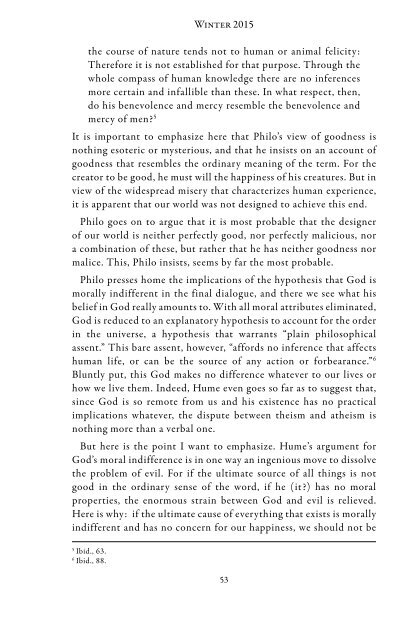THE CITY
h6c7p5d
h6c7p5d
You also want an ePaper? Increase the reach of your titles
YUMPU automatically turns print PDFs into web optimized ePapers that Google loves.
the course of nature tends not to human or animal felicity:<br />
Therefore it is not established for that purpose. Through the<br />
whole compass of human knowledge there are no inferences<br />
more certain and infallible than these. In what respect, then,<br />
do his benevolence and mercy resemble the benevolence and<br />
mercy of men? 5<br />
It is important to emphasize here that Philo’s view of goodness is<br />
nothing esoteric or mysterious, and that he insists on an account of<br />
goodness that resembles the ordinary meaning of the term. For the<br />
creator to be good, he must will the happiness of his creatures. But in<br />
view of the widespread misery that characterizes human experience,<br />
it is apparent that our world was not designed to achieve this end.<br />
Philo goes on to argue that it is most probable that the designer<br />
of our world is neither perfectly good, nor perfectly malicious, nor<br />
a combination of these, but rather that he has neither goodness nor<br />
malice. This, Philo insists, seems by far the most probable.<br />
Philo presses home the implications of the hypothesis that God is<br />
morally indifferent in the final dialogue, and there we see what his<br />
belief in God really amounts to. With all moral attributes eliminated,<br />
God is reduced to an explanatory hypothesis to account for the order<br />
in the universe, a hypothesis that warrants “plain philosophical<br />
assent.” This bare assent, however, “affords no inference that affects<br />
human life, or can be the source of any action or forbearance.” 6<br />
Bluntly put, this God makes no difference whatever to our lives or<br />
how we live them. Indeed, Hume even goes so far as to suggest that,<br />
since God is so remote from us and his existence has no practical<br />
implications whatever, the dispute between theism and atheism is<br />
nothing more than a verbal one.<br />
But here is the point I want to emphasize. Hume’s argument for<br />
God’s moral indifference is in one way an ingenious move to dissolve<br />
the problem of evil. For if the ultimate source of all things is not<br />
good in the ordinary sense of the word, if he (it?) has no moral<br />
properties, the enormous strain between God and evil is relieved.<br />
Here is why: if the ultimate cause of everything that exists is morally<br />
indifferent and has no concern for our happiness, we should not be<br />
5<br />
Ibid., 63.<br />
6<br />
Ibid., 88.<br />
Winter 2015<br />
53


